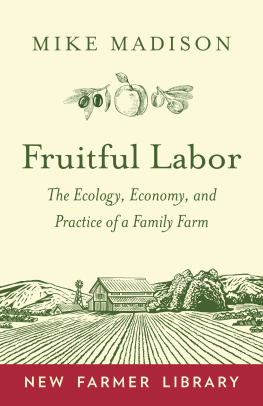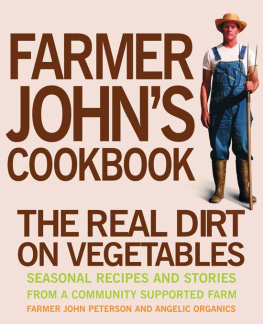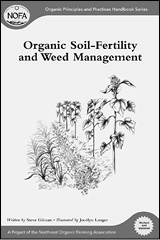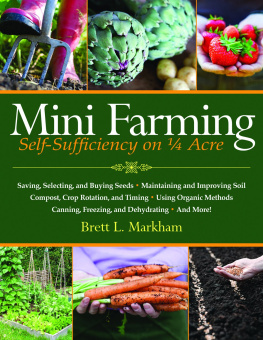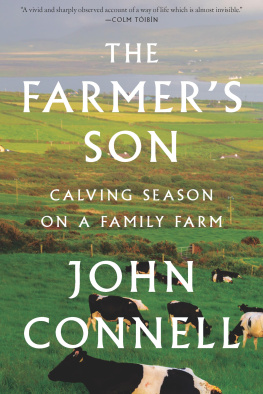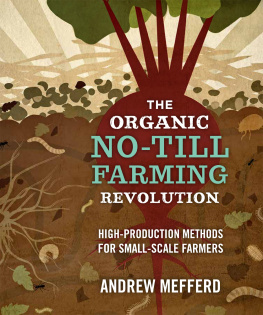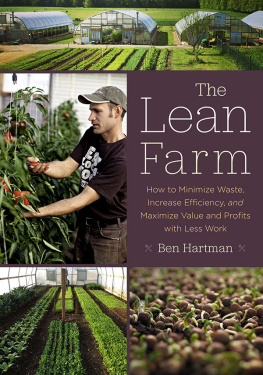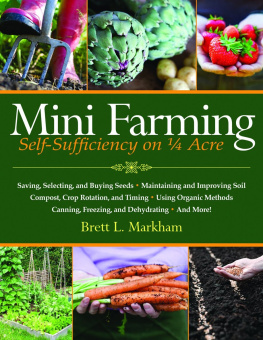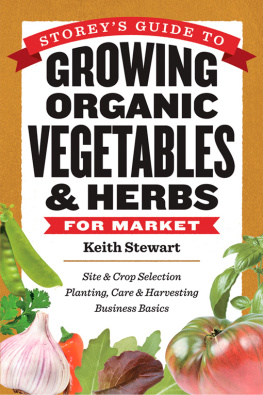Praise for Fruitful Labor
Fruitful Labor is a delightful book, full of practical advice and deep thinking about ecology and true sustainability. I highly recommend it for anyone interested in food and farming, but especially for young farmers looking to build their skills while gaining wisdom from someone experienced and respected in the field.
Ben Hartman , author of The Lean Farm and The Lean Farm Guide to Growing Vegetables
Mike Madison offers new and aspiring farmers a book outside the usual vein of small farm narratives and how-to tomes. Discontented with both formulaic prescriptions for the idealized family farm and mega-data studies that sacrifice particularities for trends, Madison instead digs deep into the three decades of farming history on the California plot where he and his wife raise more than 200 plant varieties, ranging from vegetables to flowers to olivesand no sacred cows. Madison puts nothing other than nature itself on a pedestal, and he questions his every decision by way of an ecological mirror that reflects back on him without embellishment or distortion.
He confesses that he is not enamored with the current celebrations of mission statements, goals, and strategies. Rather, he describes the evolution of his family farm as a timeline without a road mapdecision points on a long chronology, all informed by unhurried observation. His story is one of searching out hard-won possibilities through perseverance more than strategy.
New farmers would be wise to take a day and travel with Madison through the course of his thirty-plus years, learning what lenses to use in examining each ecological, economic, and community-minded decision that all farmers face.
Philip Ackerman-Leist , professor of sustainable agriculture and food systems, Green Mountain College, and author of A Precautionary Tale
Mike Madison writes from a place of knowing that one acquires only through lived experience. The deep ecology he prescribes, which advocates the rights and values of all species regardless of their utility to human enterprises, should be the central principle of food and farming systems. Akin to the creature in the crystal river in Richard Bachs book Illusions, Mike stopped clinging a long time ago and let the current take him to a higher plane of thought and deed. Proof of this is sprinkled throughout Fruitful Labor .
This book is a must-read for those embarking on their journey into farming and for all others who are remotely connected to food and farming, which is all of us.
Sridharan (Sri) Sethuratnam , director, California Farm Academy
Other Books by Mike Madison
Walking the Flatlands: The Rural Landscape of the Lower Sacramento Valley
Blithe Tomato
Copyright 2016, 2018 by Mike Madison.
All rights reserved.
Photograph on copyright 2018 by Mike Madison.
No part of this book may be transmitted or reproduced in any form by any means without permission in writing from the publisher.
Project Manager: Alexander Bullett
Project Editor: Benjamin Watson
Proofreader: Helen Walden
Designer: Melissa Jacobson
Printed in the United States of America.
First printing February, 2018.
10 9 8 7 6 5 4 3 2 1 18 19 20 21 22
Our Commitment to Green Publishing
Chelsea Green sees publishing as a tool for cultural change and ecological stewardship. We strive to align our book manufacturing practices with our editorial mission and to reduce the impact of our business enterprise in the environment. We print our books and catalogs on chlorine-free recycled paper, using vegetable-based inks whenever possible. This book may cost slightly more because it was printed on paper that contains recycled fiber, and we hope youll agree that its worth it. Chelsea Green is a member of the Green Press Initiative ( www.greenpressinitiative.org ), a nonprofit coalition of publishers, manufacturers, and authors working to protect the worlds endangered forests and conserve natural resources. Fruitful Labor was printed on paper supplied by Thomson-Shore that contains 100% postconsumer recycled fiber.
Library of Congress Cataloging-in-Publication Data
Names: Madison, Mike, 1947 author.
Title: Fruitful labor : the ecology, economy, and practice of a family farm / Mike Madison.
Description: White River Junction, Vermont : Chelsea Green Publishing, [2018]
Identifiers: LCCN 2017048973| ISBN 9781603587945 (hardcover) | ISBN 9781603587952 (ebook)
Subjects: LCSH: Farm lifeCaliforniaSacramento Valley. | Family farmsCaliforniaSacramento Valley.
Classification: LCC S521.5.C2 M34 2018 | DDC 338.109794/53dc23
LC record available at https://lccn.loc.gov/2017048973
Chelsea Green Publishing
85 North Main Street, Suite 120
White River Junction, VT 05001
(802) 295-6300
www.chelseagreen.com
CONTENTS
CHAPTER 1
The Premise
For the last 4,000 years the commonest human occupation has been small-scale agriculture. Although it has been a few generations since that was the case in the United States, the image of the small family farm is still a powerful icon of our cultural identity. Urban dwellers weary of the chaos of city life, and tech workers in their cubicles spending their days in extremes of abstraction, dream of a simple, agrarian livelihood. It is not a thousand-acre industrial farm that they are thinking of, although such farms command the majority of farmed acreage in North America, but a small, diversified farm that operates on a comprehensible human scale. And each year thousands of people, mostly young, mostly inappropriately educated, start small farms with hope and courage. Most of these farms fail, some quite rapidly, but I imagine that regrets are few.
Given the ubiquity and long history of small farms, it is surprising how little has been published describing the operation of such a farm in a logical and thorough way. There are plenty of agricultural memoirs that favor a narrativeromantic, or lyrical, or amusingof farm life, and there is much to be learned from these, but they are unsystematic and unquantified. And opposed to these is a large academic literature that is based mostly on statistical analysis of aggregated data in which the individuality of a particular farm is entirely lost.
My intent in this work is to describe the operation of a successful small farm over a period of thirty years. All agriculture is local, and the particular details of my operation might not be applicable elsewhere, but the basic variables are universal, and every farmer has to solve the same set of problems in whatever way works in his or her circumstances.
I should point out that my approach to farming is a contrary one, and my ideas of a good way to farm are at odds with mainstream farmers. There are other farmers with philosophies similar to mine, but all of us are operating at a small scale, and our collective acreage is minuscule in the big picture of American farming. So be advised that what I am presenting here is not the orthodox story.
The Scope of Agroecology
Each year, starting in mid-April, I plant 200-foot rows of cucumbers at ten-day intervals for 70 or 80 days. As the cucumbers come into readiness, I harvest them and bring them to the local farmers market on Saturday mornings and Wednesday afternoons, where I offer them for sale at three for a dollar, or, if business is slow, four for a dollar. I may barter cucumbers with some of the other farmers for produce that I dont grow myself, such as strawberries or avocados. Cucumbers that are damaged I bring home to feed to my chickens, and the rest of the unsold cucumbers I donate to a soup kitchen that feeds homeless people. This enterprise is so simple that any Chinese peasant or medieval European serf would readily understand it without further explanation.

